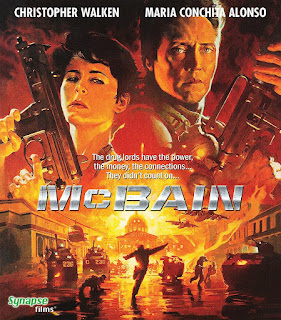McBain
Hollywood never quite knew what to do with Christopher Walken. Too low-key to be a traditional leading man, too intense to be a character actor, his career succeeded almost in spite of itself, playing everything from power-hungry Bond villains to sentimental frontiersmen. By the mid- ‘90s his personality was so recognizable in the popular culture that he could get by playing variations on his own quirks and mannerisms. But in McBain (1991) he took on a role that was unusual even by his standards: action hero.
20 years after his rescue from a POW camp, McBain (Walken) gets dragged onto the battlefield one more time to fulfill a promise to a war buddy. With the help of his well-connected friends, McBain wages a small-scale war against the president of Columbia, supporting the rebel soldiers (led by Maria Conchita Alonso) in their battle for freedom.
Actually, thanks to director James Glickenhaus, the scale isn’t so small. For all its ridiculous cliches and macho posturing, McBain is guaranteed to make you say “Holy **it!” every ten minutes or so. For audiences jaded by CGI stunts and fake blood, Glickenhaus’ film is action nirvana. Shootouts, knife fights, stinger misses and air-to-air combat, the film ups the ante with each scene, culminating in combat of Apocalypse Now-level proportions. This is not what you expect from a blink-and-you-miss-it title at the tail end of the video era.
But you will get a lot of other flaws to even things out. Like corny male camaraderie, bad accents, misguided love interests and a script that celebrates them all with zero self-awareness. Walken himself seems to take a backseat in the production, letting the film’s pyrotechnics budget do most of the heavy lifting. But for an actor who made every role seem effortless, it’s just one more IMDB entry to prove there’s nothing he can’t do.
Synapse Film’s new Blu-ray is up to their usual high standards with a sharp and vibrant transfer boosted by a new 5.1 surround soundtrack. Glickenhaus tells some great production stories on the accompanying audio commentary hosted by film historian Chris Poggiali.




Comments
Post a Comment